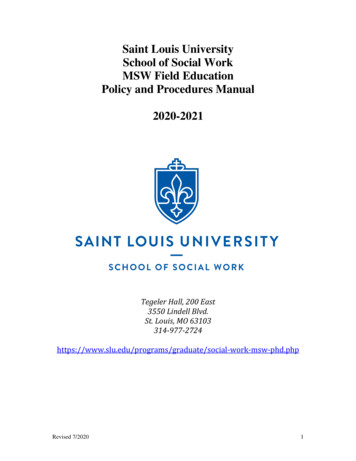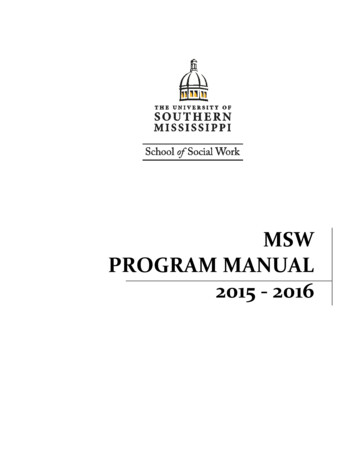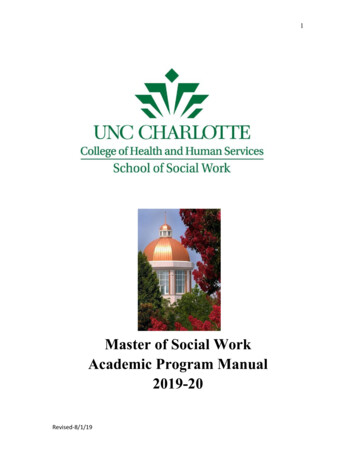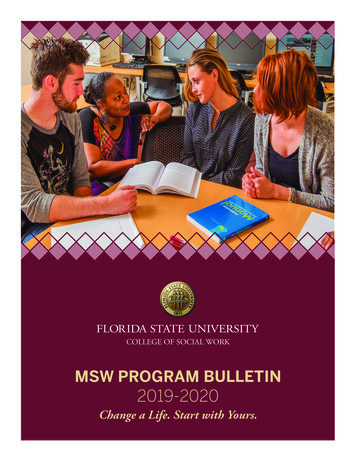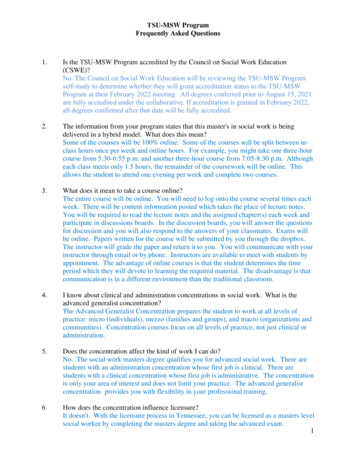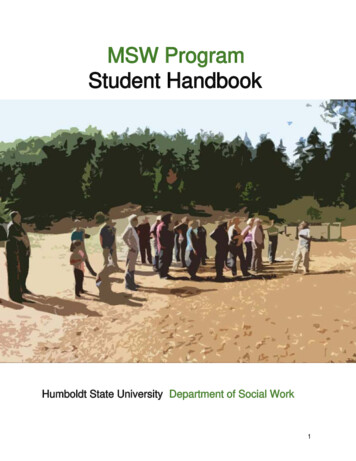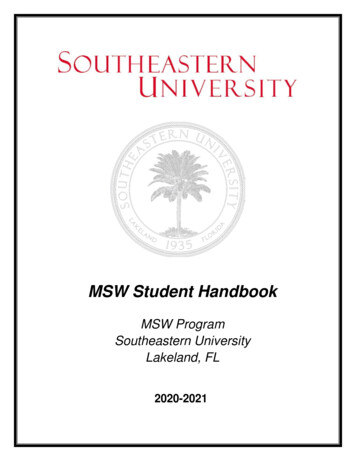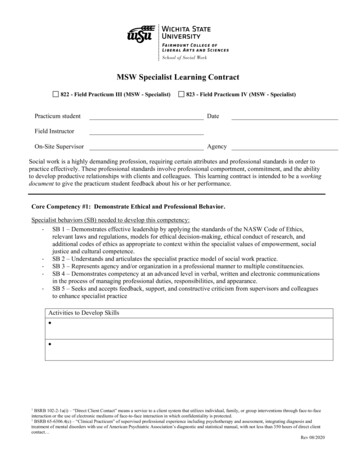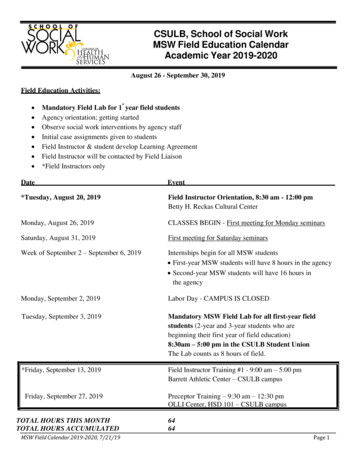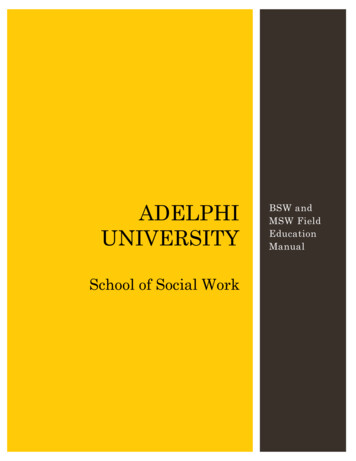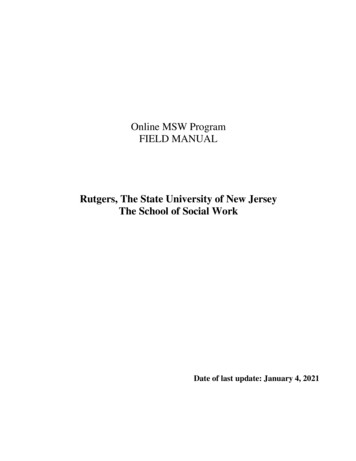
Transcription
Online MSW ProgramFIELD MANUALRutgers, The State University of New JerseyThe School of Social WorkDate of last update: January 4, 2021
INTRODUCTIONWelcome to the field component of the social work curriculum. According to the Council on SocialWork Education, field education is the “signature pedagogy” of social work education as it is thecentral learning tool in the preparation and training of students for the profession. At the RutgersUniversity School of Social Work, field and class experience are closely tied and operate in tandem.This manual has been developed to help you understand the policies and procedures of the fieldeducation program. The information here is appropriate for students in the 100% online MSWprogram. Please use this manual to better understand the field program and answer your questions.We wish you a very successful educational experience.Field NomenclatureExecutive Director of Field Education: Chief executive officer of the Field Education Departmentand oversees and manages field operations on all three campuses. The Executive Director developsnew field opportunities and assures program compliance with Council on Social Work Education(CSWE) standards.Director of Online Education: Oversees all components of the online MSW program. Responsiblefor all field programs and issues for students in the online program. Work directly with students inarranging field placements. The Director works directly with students in arranging fieldplacements, monitoring student placements and is accessible to students and field agencies offeringconsultation in all aspects of the field placement process.Senior Program Coordinator / Field Coordinator - Arranges and monitors student placements and isaccessible to students and field agencies offering consultation in all aspects of the field placementprocess.Field Liaison: Acts as the connection between the agency, the student and the school and providessupport for the Field Instructor and the student.Field Instructor: The agency-based instructor on site; this person meets with the student weeklyand prepares written evaluations at the end of each semester.Task Supervisor: The agency-based instructor on site who does not have an MSW but whoassigns tasks to the students and oversees the student’s schedule.Faculty Advisor: Faculty member assigned for academic advising and overall educational planning.u
Rutgers, The State University of New JerseyThe UniversityRutgers, The State University of New Jersey, has a unique history as a colonial college, a land- grantinstitution, and a state university. The University was chartered in 1766 as Queen's College and is theeighth institution of higher learning to be founded in the colonies. The school opened its doors in NewBrunswick in 1771 with one instructor, one sophomore, and a handful of first-year students. Duringthis early period, the college developed as a classical liberal arts institution. In 1825, the name of thecollege was changed to Rutgers to honor a former trustee and Revolutionary War veteran, ColonelHenry Rutgers. Today, with more than 50,000 students on campuses in Camden, Newark, and NewBrunswick, it is one of the nation’s major state university systems. The University comprises twentynine degree-granting divisions; twelve undergraduate colleges, eleven graduate schools, and sixschools offering both undergraduate and graduate degrees.For over 60 years, the School of Social Work has offered accredited graduate degree programs in socialwork in the state of New Jersey. The Doctor of Philosophy is offered on the New Brunswick campusas well as the Doctorate in Social Work (DSW). The Master of Social Work degree is offered on threecampuses: New Brunswick, Newark, and Camden and the undergraduate degree, the Bachelor of Artswith a major in Social Work is offered in cooperation with the Faculty of Arts and Sciences on theNew Brunswick and Camden Campuses. The program also offers a 100% online, blended online andIntensive Weekend format.Mission of the School of Social WorkTo develop and disseminate knowledge through social work research, education, and training thatpromotes social and economic justice and strengthens family and community well-being in this diverseand increasingly global environment of New Jersey and beyond.RUTGERS UNIVERSITY POLICIESDiscrimination or HarassmentIf a student believes that they have experienced discrimination or harassment at RutgersUniversity or in their field placement, please access the links below to the university’s policies.If this harassment or discrimination involved another Rutgers student, please contact the SSWOffice of Student Affairs, which can direct you to additional resources. Please also notify yourfield education office if this occurred at your field placement.Policy 60.1.28, Policy Prohibiting Sexual Harassment, Sexual Violence, Relationship Violence,Stalking and Related Misconduct by Employees and Third PartiesDiscrimination, Harassment, Workplace Violence, Sexual Misconduct, and RetaliationComplaint Process: Complaints Against University Employees and Third PartiesAcademic IntegrityAll alleged academic and professional integrity violations by students of the Graduate School ofSocial Work are referred to the Academic Integrity Facilitator (AIF), Dr. Laura Curran. Thestudent shall be notified in writing, by email or hand delivery, of the alleged violation and of thefact that the matter has been referred to the AIF for adjudication. This notification shall be done3
within 10 days of identifying the alleged violation. Once the student has been notified of theallegation, the student may not drop the course or withdraw from the school until theadjudication process is complete. A TF (temporary Fail), NG (No Grade) or incomplete gradeshall be assigned until the case is resolved. For the full policy and additional information go to:http:// academicintegrity.rutgers.edu/Office of Disability ServicesRutgers, The State University of New Jersey is committed to providing equal educationalopportunity for persons with disabilities in accordance with the Nondiscrimination Policy of theUniversity and in compliance with Section 504 of the Rehabilitation Act of 1973 and the Title IIof the Americans with Disabilities Act of 1990. The University Office of Disability Servicesassists students who require accommodations in the classroom or field setting. For details aboutaccessing those services go to: http://disabilityservices.rutgers.edu/A person with a disability is someone with a physical or mental impairment which substantiallylimits one or more of the major life activities of such individual; or a person with a record of suchimpairment; or a person who is regarded as having such impairment.The community of Rutgers University is committed to providing equal educational access forindividuals with disabilities in accordance with Section 506 of the Rehabilitation Act of 1973,Section 508 of the Rehabilitation Act of 198, and the Americans with Disabilities ActAmendments (ADAA) of 2008. An individual with a disability who is qualified to admissionwill have the same access to programs, services, and activities as all other students. RutgersUniversity will make reasonable modifications to its policies, practices, and procedures unlessdoing so would fundamentally alter the nature of the service, program, or activity, or pose anundue administrative or financial burden. The university will provide services in a manner thatpromotes independence and inclusion in all aspects of university life.University Liability PolicyIn their field placements, students are covered by University malpractice insurance for their ownpersonal and professional protection. An agency wishing to have more information aboutUniversity insurance may obtain it from the Field Education Department or the Risk ManagementOffice of the University. Students may purchase additional malpractice insurance which isavailable to members of the National Association of Social Workers.The following statement clarifies the policy of the University in regard to insurance coverage ofstudents while they are completing their field internships.Rutgers, the State University of New Jersey, shall indemnify and save harmless the Agency fromany claim or suit or action alleging bodily injury to any student from the University and suchindemnification shall be against any cost of judgment or cost of defense. This shall not apply inthe case of a specific act of negligence against an individual agency or employee of the Agency.The Agency shall indemnify and save harmless the University and the student against any claim,suit or action or cost of defense brought by a third party alleging any act or omission by the studentfrom the University which results from, or is alleged to result from, any inadequacy of training or4
supervision of the agent or employees of the Agency or inadequate supervision or training of thestudent by Agency agents or employees. With regard to protection for the student and facultymembers as a result of suits stemming from their participation in field experience, ourcomprehensive general liability policy contains an endorsement to provide coverage forUniversity employees and students "while acting within the scope of their duties with respect tothe Named Insured (Rutgers, The State University of New Jersey)."POLICY STATEMENT ON STANDARDS OF PROFESSIONAL AND ETHICALCONDUCTStandards of Professional and Ethical ConductAs the Rutgers University MSW program seeks to prepare students for professional and ethicalsocial work practice, MSW students are expected to maintain a high level of professional andethical conduct and adhere as closely as possible to professional and ethical standards articulatedin the NASW Code of Ethics and the Rutgers University School of Social Work’s professionalconduct standards as articulated below. The program expects students to conduct themselves in amanner concordant with a professional social work practitioner. In addition to the clearly definedacademic standards specified in the School of Social Work (SSW) Academics website, studentsare expected to meet the following Standards of Professional and Ethical conduct in theclassroom, in the wider university community, and in their field education settings. Failure tomaintain these standards at a level appropriate to their years in the program may result in areview by the School of Social Work’s Committee on Students. A temporary suspension fromfield practicum participation may occur during the period of review by the Committee. Adherence to the NASW Code of Ethics Professional Communication: The social work student must communicate effectively andprofessionally with other students, faculty, staff, clients, field supervisors and otherprofessionals. These standards include, but are not limited to, civility and respectfulcommunication; respectful attention and responsiveness to feedback in communication; selfawareness in communication, including controlling one’s emotional reactions and personalstress in communications with others; effective communication of academic and professionalchallenges and problem solving around these challenges with appropriate supports; and theminimization of inappropriate personal mobile communication device usage in professionaland academic settings. Professional Commitment and Behavior: The social work student must demonstrate acommitment to the profession and behave in a professionally appropriate manner.Demonstration of professional commitment and behavior includes, but is not limited to,adherence to the NASW Code of Ethics, maintaining client confidentiality, adherence toappropriate professional boundaries in client-worker relationships, self-care and the ability tocontrol emotional reactions and personal stress so it does not impact professional judgementand performance; appropriate professional attire in professional settings; and, refraining fromimpaired practice and not allowing one’s own personal circumstances or issues to interferewith their professional judgment and performance. Use of alcohol and unlawful use ofsubstances during field education, coursework and other university events may demonstrate afailure to behave and conduct oneself in a professional manner.5
Respect for Diversity and Commitment to Social Justice: The social work student mustappreciate the value of human diversity and demonstrate a commitment to understandingcultural difference and practicing cultural humility. The student must serve in an appropriatemanner all persons in need of assistance, regardless of the person's age, class, race, ethnicity,religious affiliation (or lack thereof), gender identification, ability, sexual orientation, andvalue system. The student should also respect cultural differences among their peers, faculty,supervisors and other professionals. The student should recognize how larger socialinequalities impact the individuals and communities they serve and integrate social workmethods that address the eradication of social injustice into their practice as professionallyappropriate.Students who are suspected of violating the SSW’s Standards of Professional and EthicalConduct or engage in behaviors that are harmful to clients, themselves, or the larger professionalcommunity while enrolled in the MSW program may be referred to the School of Social WorkMSW Program’s Committee on Students. Prior to a committee referral, the committee expectsthat involved parties be engaged in a problem-solving process with the support of the appropriateRU SSW offices (field education, student affairs, academic affairs etc.).By signing below, I hereby certify that Ihave read and understand the Standards of Professional and Ethical Conduct at the School ofSocial Work at Rutgers University. Additionally, I acknowledge that I have access to theinformation on the Standards of Professional and Ethical Conduct at the School of Social Workat Rutgers University. I agree to abide by the Standards set forth in this document.Committee on StudentsIn accordance with the Rutgers University School of Social Work MSW Program’s PolicyStatement on Standards of Professional and Ethical Conduct, students who are suspected ofviolating the SSW’s Standards of Professional and Ethical Conduct or engage in behaviors thatare harmful to clients, themselves, or the larger professional community while enrolled in theMSW program may be referred to the School of Social Work MSW Program’s Committee onStudents. Prior to a committee referral, the committee expects that involved parties be engaged ina problem-solving process with the support of the appropriate RU SSW offices (field education,student affairs, academic affairs etc.). A temporary suspension from field practicum participationmay occur during the period of review by the Committee. Referral to the Rutgers’ UniversitySchool of Social Work’s Committee on Students does not bar other compliance offices withinRutgers University from investigating and charging students under the appropriate andapplicable student policies (including but not limited to the University Code of Student Conductand the Rutgers University Academic Integrity Policy). The outcomes of any such investigationsmay be considered by the committee to the extent that the committee deems it relevant to thestandards.The Committee will uphold professional social work values and ethics and is concerned with thewell-being of the current and future clients as well as students. Committee members will actjudiciously and expect students to engage the School of Social Work’s Standards of Professionaland Ethical Conduct at the level appropriate for a student.6
The Committee on students is comprised of 2 elected faculty members (TT and/or NTT), a fieldeducation faculty (appointed by the Dean) and the MSW Director (in their official capacity andas standing chair). The Associate Dean of Academic Affairs serves as an ex-officio member.Committee members who have a potential conflict of interest or dual relationship with a studentreferred to the COS will be recused from participation. The Dean, if they deem appropriate, mayappoint an additional or alternative members for any session.The committee will meet on an as needed basis and no later than 30 days following a referral.Procedures for the Committee on Students1) The referring faculty or instructor will consult with the MSW Director as to whether ornot a possible violation of the SSW’s Standards of Ethical or Professional Conduct orotherwise harmful behaviors towards a client or the larger professional community hasoccurred. If upon consultation, it is determined that a possible violation or harmfulbehavior did occur, the MSW Director will instruct the referring party to place theirconcerns into writing with appropriate documentation (i.e., the request for review formand supporting materials).2) The MSW Director will then notify the committee of the request for review and set ameeting time and date. The student’s advisor will also be informed.3) The MSW Director will inform the student of the request for review in writing within 5business days of receiving the written referral. They will inform the student of their rightsand committee procedures as well as the date/time of the committee meeting. The studentwill be provided with a copy of the request for review form and be asked to submit awritten response to the committee within 5 business days of receiving the request. TheMSW Director will request a meeting with the student to review the request/concern. Thestudent’s assigned SSW advisor will also be present at this meeting.4) Students are encouraged to consult with and engage the support of their assigned Schoolof Social Work advisor throughout the review process and the advisor may be present atthe committee meeting if the student so desires. If present at the committee meeting, theadvisor cannot advocate for the student or participate in the committee’s processes.5) The MSW Director prepares a report for the committee including a summary of themeeting with the student and all accompanying documentation. This should be providedto the committee 5 business days before the scheduled meeting date. The committee canrequest additional documentation or information to be provided at the time of the hearing.The committee can also request the referring faculty to appear at the meeting.6) At the committee meeting, the committee will meet in closed session to engage indeliberations and determine if the evidence substantiates the concerns. As noted above,the committee may request that the referring faculty appear at the meeting. The studentwill be invited to speak with committee during this process. The student has the right torefuse participation.7) In addition to their assigned SSW advisor, the student has the right to invite a supportperson who is a member of the Rutgers University to attend the committee meeting withthem. If present at the committee meeting, this guest functions as a source of support for7
the student, but cannot advocate for the student or participate in the committee’sprocesses.8) If the violation of the SSW’s Standards of Professional and Ethical Conduct issubstantiated by the committee, the committee will determine appropriate sanctionsand/or make recommendations to the student. If the committee believes issues beyondthe scope of the Standards of Professional and Ethical conduct are implicated, thecommittee will notify School leadership. Sanctions and/or recommendations to studentsmay include but are not limited to: Continuation of student in the program with no conditions. The concern has beenaddressed by the committee and no follow up action is necessary. Warning or reprimand Continuation of the student in the program with conditions that may includeo Task assignments/papers (such as restitution, extra work, specialized work, orwritten reflections and/or research on various topics including ethics, specificpolicies or procedures.)o Failure to comply with conditions may result in further recommendations orsanctions Suspension/withdrawal from field practicum and/or withdrawal from co-requisiteclasses Probation with terms Leave of Absence (recommendation/advisement only) Suspension from MSW program Dismissal9) The Committee’s meetings will be documented by the MSW Director in the form ofmeeting minutes and distributed to the members for review. All decisions,recommendations, or requirements determined by the Committee will be provided to thestudent and her/his advisor in writing by the MSW Director within 10 business days ofthe committee meeting. This letter will include information regarding appeal procedures.Failure to submit an appeal by the appropriate deadline will render the decision final andconclude the review process.10) The student may appeal in writing to the Dean of the School within 10 business days ofreceiving the written determinations of the Committee on Students. The appeal process isan entirely written process. The Dean may uphold, modify, or remand the actions of theCommittee. Grounds for appeal are limited to:a. Unsupported Conclusion: The decision made by the Student Review Committee isnot supported by the facts of the case.b. Procedural Error: The Student Review Committee process did not conform withprescribed procedures. The error committed must be determined to havesubstantially impacted the fairness of the disciplinary process.8
c. New Information: There is new information available that wasn’t available at thetime of the original Student Review Committee meeting and it is sufficient to alterthe original decision.d. Disproportionate Sanction: The sanction imposed against the student was notappropriate for the offense committed.11) The response to the appeal with be granted within 10 business days. The decision of theDean of the School of Social Work is final and binding.12) Throughout the process, all administrative procedures will be monitored by the MSWDirector and one of the elected committee members to ensure the Committee’sprocedures, intentions, and determinations are fully in compliance with School of SocialWork policy and protects students’ rights articulated below.13) All decisions/actions made by the Committee are considered private and only shared withappropriate school personnel on a need to know basis.14) If at any point in the review process, any member of the Committee believes there is animmediate threat to the safety and security of the student or the community (includingclients served), the appropriate University/community authorities will be contacted.Students’ Rights: The Rutgers University School of Social Work MSW program values studentrights and adherence to procedural processes. The student has a right to 1) review the writtenrequest for committee review and receive a copy of committee procedures in writing; 2) consultwith the MSW Director concerning the suspected violation, their rights and committeeprocedures; 3) consult with their advisor throughout the review process; 4) submit a writtenresponse to the committee; 5) appear at the committee meeting; 6) invite a support person who isa member of the Rutgers University Community to attend, but not participate in, the committeemeeting with them; 6) right to a reasonable accommodation as necessary to participate in thisreview process; 7) receive a written summary of the committee’s findings and decisions within10 business days of the committee’s meeting; 8) appeal the Committee’s decision; and 9) receivea written response to an appeal with 10 business days of the appeal’s submission.Technical Standards for Admission, Matriculation, Progression and Program CompletionAs the Rutgers University MSW program seeks to prepare students for professional and ethicalsocial work practice, MSW candidates1 are expected to meet the program’s academic standards,maintain a high level of professional and ethical conduct, and adhere as closely as possible toprofessional and ethical standards articulated in the NASW Code of Ethics. In addition to theclearly defined academic standards specified in the School of Social Work (SSW) Academicswebsite and the School’s Standards for Professional and Ethical conduct delineated in the MSWprogram handbook, the School has identified a set of technical standards that specify the nonacademic attributes, abilities, and skills candidates must demonstrate for admission, retention,progression, and graduation from the MSW program.Admission to the School of Social Work is conditional on the candidate’s ability to achieve andThe term “candidate” refers to candidates for admission to SSW as well as current SSW students who are enrolledand seek to progress and graduate.19
meet these technical standards in conjunction with the academic standards, with or withoutreasonable accommodation, and depends on a process that examines and values all pertinentskills, attitudes, and attributes of each candidate on a case-by-case basis. The School of SocialWork adheres to the highest ethical and professional standards of the Social Work profession. Indoing so, the School of Social Work reserves the right to deny admission to candidates or todischarge candidates who, upon completion of this interactive process, cannot meet thesetechnical and/or academic standards or who would be deemed to pose a threat to patients andothers in the educational and clinical (i.e., field education) environment. Under allcircumstances, a candidate should be able to perform in an independent manner. The use of anintermediary in the clinical setting is ordinarily not permitted and may never be used as asubstitute for a candidate’s judgment or intellectual acumen. The use of an intermediary wouldbe considered only when it does not alter an essential element or function of these technicaland/or academic standards. Professional Communication: The social work candidate must be able to communicateeffectively and professionally with other students, faculty, staff, clients, field supervisors andother professionals from a variety of educational and cultural backgrounds in accordancewith the NASW Code of Ethics. Candidates must be able to communicate effectively andefficiently (in English) and must be able to clearly and accurately record information andinterpret verbal, written, and nonverbal communication. Candidates must also be open toreceive feedback from other social work or allied professionals as well as their peers.Observation Skills: Observation requires the use of visual, auditory, and somatic senses (orthe functional equivalent) in a variety of areas related to contemporary social work practice.Candidates must have the ability to observe and evaluate in classroom settings, small groupteaching exercises, one-on-one evaluation, social work settings and practice sites. Candidatesmust be able to observe a client accurately, particularly as related to social work assessmentand intervention.Motor and Sensory: A candidate must demonstrate sufficient motor and sensory function tosuccessfully complete a class and field practicum, with or without reasonableaccommodations.Intellectual, Conceptual, and Integrative Abilities: Candidates must possess adequateintellectual, conceptual and integrative abilities to successfully complete coursework andfield practicum. Social work practice entails assessing and intervening in complex situationswith vulnerable populations and social workers must possess these abilities to engage incomplex problem-solving and practice effectively.Behavioral and Interpersonal Attributes: A candidate must possess the appropriatebehavioral and interpersonal attributes in order to develop and maintain professionalrelationships with clients, colleagues, instructors, and community members in accordancewith the NASW Code of Ethics and the RU SSW Standards of Professional and EthicalConduct. These include, but are not limited to, emotional self-regulation, self-awareness,flexibility, and compassion. The candidate must be able serve (in an appropriate manner), allpersons in need of assistance, regardless of the person's age, class, race, ethnicity, religiousaffiliation (or lack thereof), gender identification, ability, sexual orientation, and valuesystem. The candidate should also respect cultural differences among their peers, faculty,supervisors and other professionals.10
Field Education Practicum: An integral part of the social work education process is thecompletion of generalist and specialized social work field education practicum experience.Within the constraints established by law, in these experiences student social work interns areplaced in social work practice settings and expected to function at the professional level of asocial worker with the highest ethical standards.Candidates are expected to maintain a high standard of professional behavior includingadherence to the School’s standards of professional and ethical conduct and the NASW code ofethics. Additionally, candidates are expected to adhere to HIPAA regulations (if applicable),which include but are not limited to maintaining client confidentiality, and the protection ofaccess to client records. Candidates are expected to take responsibility for their own learning anddemonstrate a willingness to engage clients, social workers and allied professionals, and othersin the provision of client-focused services and care.A candidate, whose behavior or performance raises questions concerning his/her ability to fulfillthese technical standards, will be referred to the Assistant Dean of Student Affairs(amhunter@ssw.rutgers.edu) and may be required to obtain an evaluation and/or testing by ahealth care provider designated/approved by the School, if appropriate. The results will beprovided to appropriate School/University leadership to determine whether the student is fit topursue the ed
The Master of Social Work degree is offered on three campuses: New Brunswick, Newark, and Camden and the undergraduate degree, the Bachelor of Arts with a major in Social Work is offered in cooperation with the Faculty of Arts and Sciences on the New Brunswick and Camden Campuses. The program also offers a 100% online, blended online and
